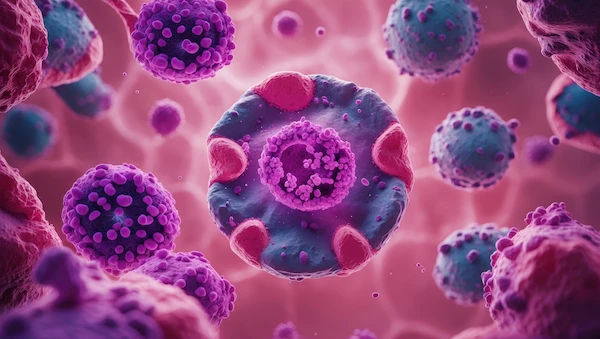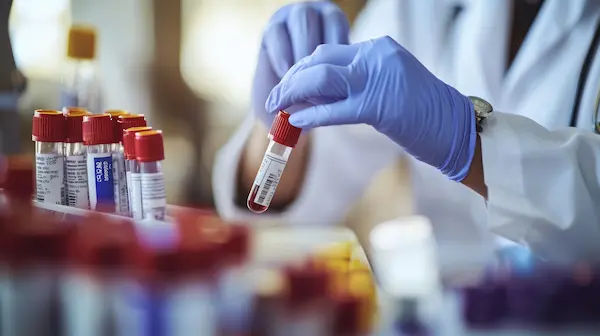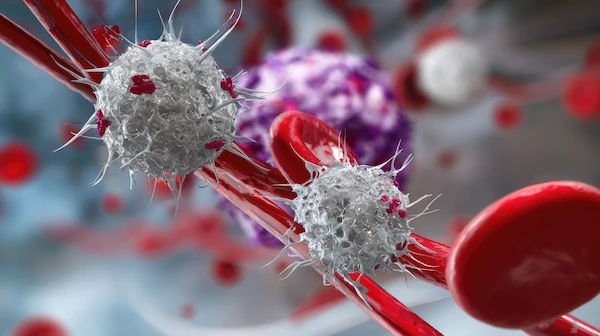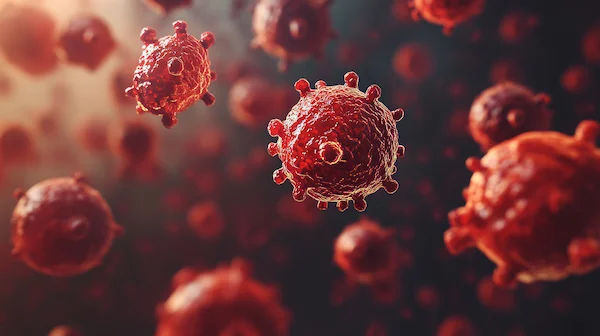What is Blood Cancer? A Brief Overview
Learn the early warning signs of blood cancer, including leukemia, lymphoma, and myeloma. Understand symptoms, diagnosis methods, and why early detection is crucial for better treatment outcomes.

Written by Dr. Rohinipriyanka Pondugula
Reviewed by Dr. Dhankecha Mayank Dineshbhai MBBS
Last updated on 13th Jan, 2026

What is Blood Cancer? A Brief Overview
Blood cancer, or hematologic cancer, is a broad term for malignancies that affect the production and function of your blood cells. Most of these cancers start in the bone marrow, the soft, spongy tissue inside your bones where blood is produced. In a healthy body, bone marrow stem cells mature into three vital types of blood cells: oxygen-carrying red blood cells, infection-fighting white blood cells, and clotting platelets. Blood cancer disrupts this orderly process. The uncontrolled growth of abnormal blood cells interferes with the blood's ability to fight infection, carry oxygen, and control bleeding.
The Three Main Types: Leukemia, Lymphoma, and Myeloma
- Leukemia: Rapid production of abnormal white blood cells in the bone marrow, crowding out healthy blood cells. Most common in children but affects adults more frequently overall.
- Lymphoma: Affects the lymphatic system, causing malignant growth of lymphocytes that collect in lymph nodes and other tissues.
- Myeloma: Targets plasma cells that produce antibodies. Myeloma cells accumulate in bone marrow, crowding out healthy cells and causing bone damage. Often called multiple myeloma because it affects multiple areas.
The Critical Importance of Early Detection in Blood Cancer
Early detection can dramatically improve outcomes. Blood cancers detected at an early stage are often more responsive to treatment.
How Early Intervention Improves Treatment Outcomes
- More Treatment Options: Wider range of therapies, potentially less aggressive.
- Higher Success Rates: Early-stage cancers may be curable rather than just palliative.
- Better Tolerance: Patients are stronger and better able to withstand treatments like chemotherapy or stem cell transplants.
- Prevention of Complications: Early treatment can prevent severe anemia, catastrophic bleeding, or life-threatening infections.
The Challenge: Why Blood Cancer Signs Are Often Missed
Early symptoms are nonspecific—fatigue, fever, and aches resemble common viral infections. Bruises, night sweats, or persistent low-grade fevers are easily dismissed. Persistence and combination of symptoms over weeks is the key differentiator.
Consult an Oncologist for Personalised Advice
10 Early Warning Signs of Blood Cancer You Shouldn't Ignore
If symptoms persist for more than two weeks without a clear cause, consult a doctor.
1. Unexplained Fatigue and Weakness
Profound exhaustion not relieved by rest, caused by anemia—a shortage of red blood cells.
2. Fever, Chills, and Persistent Infections
Frequent infections suggest white blood cells are abnormal or too few to fight germs.
3. Unintentional Weight Loss and Loss of Appetite
Significant weight loss without trying indicates energy consumption by cancer cells.
4. Bruising Easily and Unusual Bleeding
Minor bruises, frequent nosebleeds, bleeding gums, or tiny red spots (petechiae) indicate low platelet count.
5. Bone and Joint Pain
Cancer cells overcrowd bone marrow, causing dull or sharp pain, especially in the back, ribs, or long bones.
6. Swollen Lymph Nodes
Painless swelling in the neck, armpits, or groin may indicate lymphoma.
7. Night Sweats and Shortness of Breath
Drenching sweats and breathlessness due to anemia or chest lymph node involvement.
8. Feeling Full Quickly and Abdominal Discomfort
Enlarged spleen (splenomegaly) can press on the stomach, causing early satiety or pain.
9. Skin Rashes or Itchy Skin
Certain lymphomas cause lumps, red or purple patches, or intense itching without visible rash.
10. Persistent Cough or Chest Pain
Swollen lymph nodes pressing on airways or vessels may cause ongoing cough or chest discomfort.
How is Blood Cancer Diagnosed?
Blood Tests: Complete Blood Count (CBC)
Measures levels of red cells, white cells, and platelets. Abnormal counts are often the first clue. Home sample collection is available via Apollo24|7.
Imaging Tests: CT, PET, and MRI
Visualizes swollen lymph nodes, tumors, or organ enlargement. PET scans are especially useful for lymphoma staging.
Biopsy and Bone Marrow Aspiration
A biopsy of lymph nodes or a bone marrow sample confirms diagnosis. Bone marrow aspiration involves withdrawing liquid and solid marrow to analyze cancer cells at their source.
Conclusion
Recognizing persistent or unusual symptoms early can save lives. Blood cancer symptoms are often subtle but consistent, and early detection opens doors to more treatment options and better outcomes. Listen to your body, act promptly, and consult a healthcare professional. Timely evaluation could make all the difference in your prognosis.
Consult an Oncologist for Personalised Advice
Consult an Oncologist for Personalised Advice

Dr. Gopal Kumar
Head, Neck and Thyroid Cancer Surgeon
15 Years • MBBS, MS , FARHNS ( Seoul, South Korea ), FGOLF ( MSKCC, New York )
Delhi
Apollo Hospitals Indraprastha, Delhi
(25+ Patients)

Dr Gowshikk Rajkumar
Oncologist
10 Years • MBBS, DMRT, DNB in Radiation oncology
Bengaluru
Apollo Clinic, JP nagar, Bengaluru

Dr. Praveen Kumar Garg
Surgical Oncologist
26 Years • MBBS, M.S.(Gen.Surg.), M.Ch.(OncoSurg.)
Delhi
Apollo Hospitals Indraprastha, Delhi
(50+ Patients)
Dr. B Shravanthi Reddy
Radiation Specialist Oncologist
8 Years • MBBS, DNB(Radiation Oncology)
Manikonda Jagir
Apollo Clinic, Manikonda, Manikonda Jagir

Dr Shaikat Gupta Director Surgical Onco
Surgical Oncologist
35 Years • MBBS (University Gold Medalist), MS, FRCSEd
Kolkata
Apollo Multispeciality Hospitals , Kolkata, Kolkata
(250+ Patients)
Consult an Oncologist for Personalised Advice

Dr. Gopal Kumar
Head, Neck and Thyroid Cancer Surgeon
15 Years • MBBS, MS , FARHNS ( Seoul, South Korea ), FGOLF ( MSKCC, New York )
Delhi
Apollo Hospitals Indraprastha, Delhi
(25+ Patients)

Dr Gowshikk Rajkumar
Oncologist
10 Years • MBBS, DMRT, DNB in Radiation oncology
Bengaluru
Apollo Clinic, JP nagar, Bengaluru

Dr. Praveen Kumar Garg
Surgical Oncologist
26 Years • MBBS, M.S.(Gen.Surg.), M.Ch.(OncoSurg.)
Delhi
Apollo Hospitals Indraprastha, Delhi
(50+ Patients)
Dr. B Shravanthi Reddy
Radiation Specialist Oncologist
8 Years • MBBS, DNB(Radiation Oncology)
Manikonda Jagir
Apollo Clinic, Manikonda, Manikonda Jagir

Dr Shaikat Gupta Director Surgical Onco
Surgical Oncologist
35 Years • MBBS (University Gold Medalist), MS, FRCSEd
Kolkata
Apollo Multispeciality Hospitals , Kolkata, Kolkata
(250+ Patients)
More articles from Blood Cancer
Frequently Asked Questions
Can a routine blood test detect early signs of blood cancer?
Yes, a Complete Blood Count (CBC) can reveal abnormal blood cell levels that prompt further investigation.
Is blood cancer usually curable if caught early?
Many blood cancers have high remission rates when detected early. Prognosis varies by type and subtype.
What are the main risk factors for developing blood cancer?
Advanced age, family history, previous chemotherapy/radiation, chemical exposure (like benzene), smoking, genetic syndromes, and certain viral infections (HIV, Epstein-Barr virus).
Are night sweats always a sign of cancer?
No. Night sweats can also be caused by infections, hormonal changes, medications, or anxiety. Drenching sweats that persist should be evaluated.
How quickly does blood cancer progress?
It varies. Acute leukemias progress rapidly, while chronic leukemias and some lymphomas may grow slowly and be monitored for years.

.webp)


